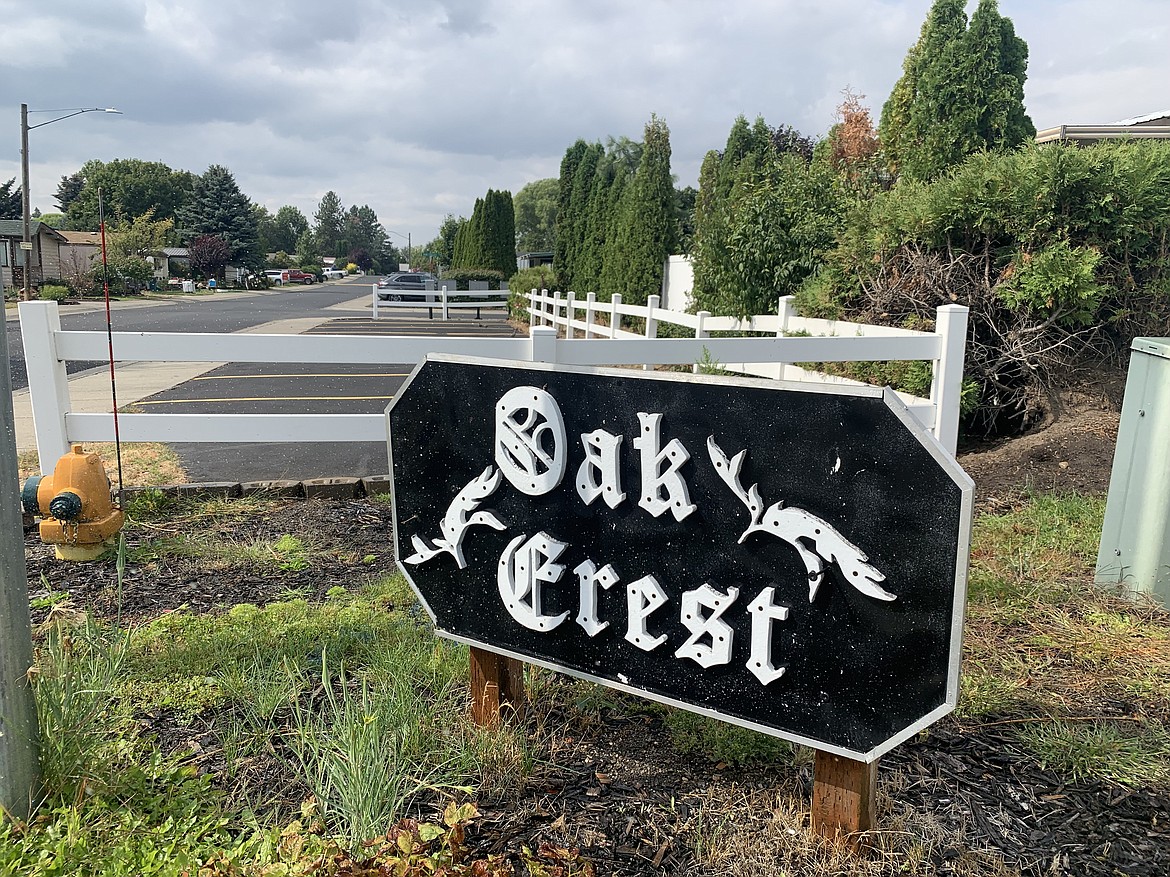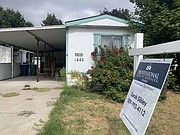Time to unite: Cd’A mobile home residents hope to buy their park
COEUR d’ALENE — Those who live in manufactured or mobile home communities, one of the few affordable housing options available in Kootenai County, are especially vulnerable to displacement — but residents of one such neighborhood are fighting to take ownership of their homes and inspire others to do the same.
Last August, a Utah-based investment company called Havenpark Communities purchased Oak Crest, a manufactured home community in Coeur d’Alene with nearly 500 residents.
Since then, residents say rent has increased significantly — and many are struggling to keep up.
“A lot of people were afraid,” said Michael Collun, an Oak Crest resident since 2019.
In letters submitted to The Press, residents said rent for existing tenants will jump in November from $365 per month to $447 per month. That’s a 23% increase. In the past, residents said they were accustomed to rent increasing by around $30 a month every few years.
Meanwhile, the lot rent for new residents has increased 33%, from $595 per month last August to $795 per month.
Collun owns his manufactured home and can afford the lot rent for now. But he’s concerned for his neighbors, many of whom live on modest incomes and originally moved into Oak Crest with the intention of it being their “forever home.” For them, the future is uncertain.
That’s why Collun is among a group of Oak Crest residents who plan to form a homeowner association with the goal of eventually purchasing their neighborhood.
Residents of manufactured home communities may own the homes where they live but not the land on which the homes sit. The park owner typically rents the lot space to residents.
If the owner decides to sell the park, the new owner might increase rent, change leases or stop operating the space as a park entirely, forcing the residents to move.
Because manufactured homes built after 1976 are costly and difficult to move once placed, many residents have no choice but to abandon their homes when a park stops running.
This leaves many residents in a difficult position, where they’re subject to rent increases and other changes but unable to leave easily if the rising costs become too much.
Some residents want to make Oak Crest a resident-owned community, or ROC.
In this model, homeowners form a cooperative. Each household is a member of the cooperative, which owns the land and manages the community. Members continue to own their homes individually, as well as an equal share of the land.
To some manufactured home residents, real ownership seems like a pipe dream. But communities across the country have made it a reality.
“Resident ownership is an option,” said Victoria O’Banion. “This is real.”
O’Banion is a marketing and acquisitions specialist for ROC Northwest, a wing of ROC USA. The New Hampshire-based nonprofit helps residents purchase their manufactured home communities.
ROC Northwest has helped facilitate the purchase of more than 20 resident-owned communities in Washington and two in southern Idaho — so far. More than 1,000 people live in those communities.
The resident-owned community model is “plug and play,” O’Banion said. Park owners get a fair purchase price and individual residents are not asked to put any equity into the purchase.
“But we need to have sellers who want to preserve their communities and give their residents a chance at the American dream,” she said.
After an ROC is established, monthly rent is the mortgage payment and operating costs divided by the number of lots. Rent typically increases, but it’s stable and residents own the land on which they live.
For that reason, O’Banion said, manufactured homes in ROCs tend to increase in value in a way that homes in traditional parks don’t. Residents don’t want to leave, while others are eager to move in.
In 2019, residents of C&C Community, a park in Billings, Mont., bought the park from its owner and incorporated themselves into a cooperative nonprofit.
After the purchase, The Billings Gazette reported that residents said the C&C community bonded as neighbors and made significant infrastructure improvements. They were eligible for a number of grants and programs, including a $385,000 community development block grant through the city of Billings.
Residents of Meadowlark Community mobile home park, also in Billings and also owned by Havenpark, might get a chance to buy their neighborhood. Havenpark is shopping the property around after two years of issues, including brown and black water pouring from taps, according to The Billings Gazette.
There are more than 4,000 manufactured homes in parks throughout Kootenai County. Most are in Coeur d’Alene and Post Falls.
For more than a year, the challenges facing manufactured home residents have been on the radar of the Regional Housing and Growth Issues Partnership.
A cross-section of community leaders and concerned citizens teamed up last year to form the partnership amid skyrocketing housing costs in Kootenai County.
The group has a subcommittee dedicated to ROCs, which is now expanding into a larger coalition.
“There is hope,” said Kiki Miller, a Coeur d’Alene City Council member who has led the partnership for nearly two years.
The group is compiling updates on the coalition’s progress, as well as other resources, on its website: www.rhgip.com.
Miller said the coalition will support and promote the efforts of Oak Crest residents.
“I am encouraged that there is a large group of people willing to work together to address this important aspect of affordable living in Kootenai County,” she said.
Forming an ROC can be tough after a purchase has happened. But Collun said Oak Crest residents are determined to try. The first step is to form a homeowners association, which 51% of residents must agree to join for a fee as low as $1.
“I don’t believe it’s a lost cause,” Collun said. “I believe the best thing is for Oak Crest to become a resident-owned community.”
Even if they’re unable to purchase their home, Collun said he and his neighbors hope to show residents of other manufactured home communities in North Idaho that it’s possible.
“If communities unite, there’s nothing they can’t do,” he said.



